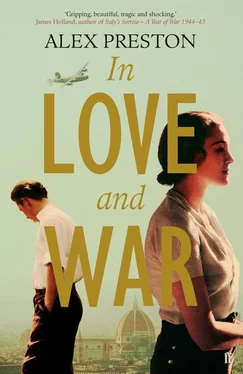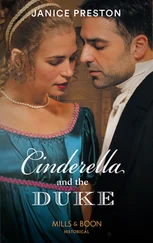The early months of 1943 bring deep snow and silent, frosty mornings. Esmond had thought that, after the success of their first job, missions for the Resistance would be delivered into their lives in regular, manageable manila envelopes. Instead, apart from frequent visits from Bruno carrying cryptic messages for the W/T, the months of snow and ice pass much as before at L’Ombrellino.
Abroad, though, it is a different matter. Esmond and Ada lying rapt as the good news registers from the Vatican, Moscow, London. The wireless on the table in their bedroom is almost never off. When the German 6th Army surrenders and the Battle of Stalingrad is over, Esmond wakes Ada and they listen together to Radio Moscow playing the Internationale . She looks up at him with a sleep-fogged grin. Even the eyes of the three martyrs seem to soften at the news. The music stops and they hear the voice of the Russian announcer, breaking every so often with emotion as he reads a report of the final battle. They understand almost nothing of what he says but the hopeful relief. They make love then, pressing their cold bodies together, and she’s crying when she comes. He kisses her mole and tastes salt.
The foul weather, which has cut off the mountain passes, keeps the partisans to their hideouts in the hills. The rag-tag members of the Resistance spend the winter planning, discussing. Esmond makes a night-time foray down into the city to pick up a package from the Professor at the university. He hides it in the bottom of George Keppel’s wardrobe until a Chetnik Serb, who grins at him through his thick black beard, comes to collect it.
There are more and more Nazis in Florence; the Professor tells of Bach and Beethoven in the city’s churches, Furtwängler and von Karajan flown in to give gala performances. After the concerts, the Germans congregate at the Paszkowski Bar in the Piazza Vittorio Emanuele or at the Braunhaus — a rococo apartment near the German Consulate on the via dei Bardi — where they serve beer from Munich, bratwurst and Wiener schnitzel. Red and black swastika flags hang from the windows and, most evenings, the sound of Hitler’s voice giving long, jagged speeches is heard until the cheers of the men inside drown it out. The locals stand with their ration cards in the street below, half-crazed with hunger.
They follow news from the ghetto in Warsaw hopelessly, helplessly. Reports come to them in stuttering bursts, like rifle fire over the radio waves. They hear of the Waffen SS entering on the eve of Passover, the bodies suspended from the clock tower. They hear of members of the Resistance hiding in sewers and culverts, brandishing Molotov cocktails and pilfered weapons. For a moment, just as the first warm sunshine brings buds and birdsong to the garden, there is a window of optimism, as the Nazis retreat. Then silence for a month. In May, when the rebellion is finally crushed, the ghetto torched, the members of the Resistance shot and hanged, Ada stays up in the bedroom, looking at the triptych, her eyes very cold and very clear. Esmond brings her tea and books, sits on the bed and rubs her feet between his hands. She comes downstairs again once she hears that Lampedusa has fallen. A piece of Italy is in Allied hands. Bruno is carrying two bottles of Chianti with when he comes to see them that evening and they sit out on the terrace and toast the fall of Fascism.
In July, a Wednesday arrives with no visit from Bruno. Ada is sick and so they spend the day lying in bed listening to the BBC report the British landing on Sicily. The Germans haven’t had the time to reinforce the Italian mainland; it is thought that the country will fall in a matter of weeks. Ada leans over the side of the mattress and vomits into a metal bin. Every so often, Esmond goes down to the bottom of the garden to check for Bruno. As night falls, he makes a final trip down to the copse with Tatters and sees the blonde head of Tosca bobbing through the trees towards him.
‘Where’s Bruno?’ he asks.
She is out of breath and sits down on one of the chairs beside the pool. ‘Bruno is fine,’ she says. ‘They have Maria Luigia, though.’
‘Who have her?’
‘The Blackshirts, Carità,’ she says, scowling. ‘She was found carrying forged passports. She’s been taken to the Murate. Bruno thinks we’ll be able to spring her. I think he’s crazy.’ She circles her finger by her head.
‘Is there anything we can do?’ he asks.
‘Sit tight,’ she says. ‘I must go now.’
Bruno comes up to see them the next day. Ada is still sick, and so the thin, tired-looking man comes to speak to them in their bedroom.
‘You have the paintings up here. Very gothic,’ he says when he walks in. ‘And a pistol beside the bed. I’m impressed.’ He looks down at Ada, who has a sheen of sweat on her forehead. ‘Are you all right?’ he asks, cocking the matchstick in the corner of his mouth.
‘I’m fine,’ she says. ‘It’s just an infection. The water in the well isn’t as clean as it was. Is there news of Maria Luigia?’
He stoops to stroke Tatters, who has wandered in at their feet. ‘She’s being held while they try to extract information from her. She’s a strong woman, though. I’d rather it were her than almost anyone else. The bastards will torture her, I’d imagine, but she’ll do well.’
Bruno leaves and they sit listening to the radio. Neither of them feels like eating. Night falls and it is hot in the room, even with the windows open. Both of them are sweating and each time Esmond drifts into a shallow sleep, he sees Maria Luigia’s plump, friendly face, a shadow looming over it. He wakes with a start, three, four, five times. Finally, Ada turns and puts her arms around him.
‘Darling, I’m pregnant,’ she says.
The first they know is the ringing of the great bell — La Vacca — in the Palazzo Vecchio. They are down by the pool, dangling their feet in the water, trying to get cool in the airless evening. Esmond gets a kick of pleasure each time he thinks about the baby. He feels at once braver and more nervous than ever before. Ada is still sick, drained by the heat, irritable. ‘The baby is not the most important thing,’ she says with a frown, whenever he drapes moony fingers across her belly. Now frogs swim in the pool, pesto-thick with weed and algae. The dodos seem almost alive, so shrouded are they with moss and lichen.
The bell begins to ring just past seven in the evening. It rings for half an hour without stopping and soon there are pistol shots from the town below them. When the bell stops, they catch distant cheers echoing up the hillside. At once, they look at each other and hurry up to the bedroom. Esmond tunes the radio to the BBC. The announcer — it is Alvar Lidell — speaks in a voice of quiet wonder. The Fascist government of Benito Mussolini has been overthrown in a bloodless coup, he says. Marshal Badoglio has announced that Italy will continue to fight alongside its German allies. Former Prime Minister Mussolini has been sent into exile on the island of Maddalena. There will be a further address by King Victor Emmanuel and Prime Minister Badoglio tomorrow at twelve hundred hours Greenwich Mean Time .
Esmond and Ada stare at each other open-mouthed.
‘What does it mean?’ she asks. ‘Is it over?’
‘The war?’ he says. ‘Not yet. It can’t be. The Germans are still here.’
‘But Musso, he’s gone?’
Esmond nods.
‘And Fascism?’
He shrugs. ‘Badoglio, he’s a soldier, he’s not a Fascist.’ Ada begins to laugh, her hair bouncing as she laughs, her eyes bright and wide. Esmond runs his hands through her laughing hair as La Vacca begins to ring again. They look out of the window and over the city, where puffs of smoke appear and drift in the still evening. Two louder explosions and Esmond cranes his neck around, gazing down over the dusky Boboli Gardens to the Belvedere Fort, which is firing its cannons. Now a crackle of anti-aircraft fire answers from the opposite side of the valley, up towards Fiesole.
Читать дальше












